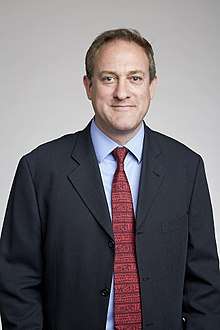Neil Burgess (neuroscientist)
Neil Burgess (born 1966)[1] FRS FMedSci[2][8] is a Professor of Cognitive neuroscience at University College London[9] and a Wellcome Trust Principal Research Fellow.[3][10][11][12] He has made important contributions to understanding memory and spatial cognition by developing computational models relating behaviour to activity in biological neural networks.[2]
Neil Burgess | |
|---|---|
 Neil Burgess at the Royal Society admissions day in London, July 2017 | |
| Born | 1966 (age 53–54)[1] |
| Alma mater | University College London (BSc) University of Manchester (PhD) |
| Awards | Royal Society University Research Fellowship[2] |
| Scientific career | |
| Fields | Neuroscience[3] |
| Institutions | University College London |
| Thesis | Neural networks, human memory and optimisation (1990) |
| Doctoral advisor | Michael A. Moore[4] |
| Influences | Chris Frith[5] Graham Hitch[6] John O'Keefe[7] Eleanor Maguire[5] |
| Website | www |
Education
Burgess was educated at University College London (UCL), where he was an undergraduate student of Mathematics and Physics.[2] He completed his postgraduate study in theoretical physics in the School of Physics and Astronomy at the University of Manchester supervised by Michael A. Moore,[4][13] where he began working on models of memory with Graham Hitch[2] and was awarded a PhD in 1990.[4]
Research and career
Burgess research in neuroscience[3] has developed models to explain how networks of neurons allow us to represent, remember and imagine our location within the surrounding environment.[2] These models provide a quantitative understanding of how spatial memory,[14] episodic memory and autobiographical memory[15] function (and dysfunction) depend on human brain activity. With Tom Hartley at the University of York and Colin Lever at Durham University he both predicted and discovered neurons representing environmental boundaries.[2][16]
Awards and honours
Burgess was elected a Fellow of the Royal Society (FRS) in 2017 and a Fellow of the Academy of Medical Sciences (FMedSci) in 2009[2] having previously held a Royal Society University Research Fellowship.
References
- Anon (2017). "Burgess, Prof. Neil". Who's Who. ukwhoswho.com (online Oxford University Press ed.). A & C Black, an imprint of Bloomsbury Publishing plc. doi:10.1093/ww/9780199540884.013.289276. (subscription or UK public library membership required) (subscription required)
- Anon (2017). "Professor Neil Burgess FMedSci FRS". London: royalsociety.org. One or more of the preceding sentences incorporates text from the royalsociety.org website where:
"All text published under the heading 'Biography' on Fellow profile pages is available under Creative Commons Attribution 4.0 International License." --"Royal Society Terms, conditions and policies". Archived from the original on 11 November 2016. Retrieved 9 March 2016.CS1 maint: BOT: original-url status unknown (link)
- Neil Burgess publications indexed by Google Scholar

- Burgess, Neil (1990). Neural networks, human memory and optimisation. manchester.ac.uk (PhD thesis). University of Manchester. Copac 36585289.
- Maguire, Eleanor A.; Burgess, Neil; Donnett, James G.; Frackowiak, Richard S. J.; Frith, Christopher D.; O'Keefe, John (1998). "Knowing Where and Getting There: A Human Navigation Network". Science. 280 (5365): 921–924. CiteSeerX 10.1.1.23.4963. doi:10.1126/science.280.5365.921. ISSN 0036-8075. PMID 9572740.

- Burgess, Neil; Hitch, Graham J. (1999). "Memory for serial order: A network model of the phonological loop and its timing". Psychological Review. 106 (3): 551–581. doi:10.1037/0033-295X.106.3.551. ISSN 0033-295X.

- O'Keefe, John; Burgess, Neil (1996). "Geometric determinants of the place fields of hippocampal neurons". Nature. 381 (6581): 425–428. doi:10.1038/381425a0. ISSN 0028-0836. PMID 8632799.

- Anon (2009). "Neil Burgess FMedSci". acmedsci.ac.uk. Archived from the original on 19 July 2018. Retrieved 17 August 2017.
- Anon (2017). "Institute of Cognitive Neuroscience Director: Professor Neil Burgess FMedSci FRS". University College London. Archived from the original on 17 April 2016. Retrieved 17 August 2017.
- Anon (2017). "Professor Neil Burgess". University College London. Archived from the original on 10 April 2013.
- Neil Burgess publications indexed by the Scopus bibliographic database. (subscription required)
- Neil Burgess publications from Europe PubMed Central
- Burgess, Neil; Shapiro, Jonathan L.; Moore, Michael A. (1991). "Neural network models of list learning". Network: Computation in Neural Systems. 2 (4): 399–422. doi:10.1088/0954-898X_2_4_005. ISSN 0954-898X.

- Burgess, Neil; Maguire, Eleanor A; O'Keefe, John (2002). "The Human Hippocampus and Spatial and Episodic Memory". Neuron. 35 (4): 625–641. doi:10.1016/s0896-6273(02)00830-9. PMID 12194864.
- Lin, Wen-Jing; Horner, Aidan J.; Burgess, Neil (2016). "Ventromedial prefrontal cortex, adding value to autobiographical memories". Scientific Reports. 6 (1): 28630. doi:10.1038/srep28630. ISSN 2045-2322. PMC 4919650. PMID 27338616.

- Hartley, Tom; Lever, Colin; Burgess, Neil; O'Keefe, John (2013). "Space in the brain: how the hippocampal formation supports spatial cognition". Philosophical Transactions of the Royal Society B: Biological Sciences. 369 (1635): 20120510. doi:10.1098/rstb.2012.0510. ISSN 0962-8436. PMC 3866435. PMID 24366125.
